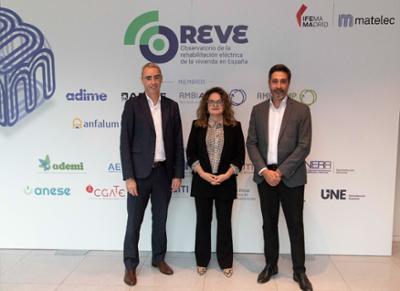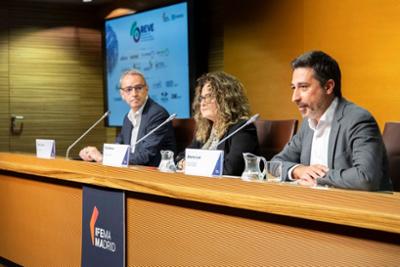

MATELEC will host the presentation of the study The decarbonisation of Spain’s residential sector: the role of electrical installation in the home conducted by OREVE.
The study, presented by the Observatory for Electrical Rehabilitation of Housing in Spain (OREVE), indicates that it will not be possible to achieve the decarbonisation targets for the residential sector in Spain without a significant drive to modernise electrical installations.
The Observatory for Electrical Rehabilitation of Housing in Spain (OREVE) has presented the results of the study The decarbonisation of Spain’s residential sector: the role of electrical installation in the home. The study was supported by MATELEC, the International Trade Fair for the Electrical and Electronics Industry, which took place in Madrid from 5 to 8 November and organised by IFEMA MADRID. The fair coincided with the Semana Internacional de la Construcción, creating a unique business ecosystem.
This research’s objective is to ascertain homeowners' perceptions of the EU target to fully decarbonise the residential sector by 2050, which is equivalent to its full electrification. Furthermore, it examines the role of homeowners in achieving this objective and the function of the electrical installation as the foundation of the energy transition in the home.
The report indicates that the most neglected area in housing remains the electrical installation, both in terms of renovation policies and homeowner practices. It is not feasible to electrify energy uses that rely on fossil fuels, which account for 40% of this energy consumption, without a proper electrical installation.
The fact that only 22.4% of Spain's 26.6 million dwellings are built in accordance with the current Low Voltage Electrotechnical Regulations, published in August 2002, together with one of the lowest refurbishment rates in Europe, indicates that a significant portion of the Spanish residential stock has electrical installations that are outdated and incompatible with current standards.
The OREVE survey of homeowners who have undertaken home improvement work in the last two years reveals a lack of awareness of the availability of energy efficiency refurbishment grants. A survey of homeowners who have invested less than €15,000 in their property revealed that 62% were unaware of the existence of subsidies. Amongst those who have invested more than €15,000, the proportion of individuals lacking this knowledge is also significant at 51%.
As evidenced by the 2023 housing refurbishment and extension data collated by MITMA, a substantial majority of applicants and recipients of comprehensive refurbishment grants are likely to have incomes well above the average.
- Most residential properties in Spain (60%) are between 50 and 90 m², with a further 25% falling within the 91 to 150 m² range.
- The average size of rehabilitated dwellings, as indicated by the data, is 108 m² for those situated in blocks and more than 135 m² for dwellings in other types of buildings.
- The CSCAE's 2023 data on large-scale refurbishment approvals show that 37,783 housing refurbishments were carried out in the residential sector, representing a total of 4,541,583 m2. This equates to an average of 120 m2 per refurbishment.
It is crucial to assess whether public subsidies have primarily benefited owners with the financial means to undertake the actions without external assistance. Considering this, it would be prudent to implement measures to enhance the energy efficiency of dwellings in lower-income households. It is also evident that there is a general lack of awareness among owners of the importance of electrical installation. Only 20% of respondents view checking and, if necessary, upgrading the electrical installation as a priority.
While the electrical installation is a key factor in the effective decarbonisation of the residential stock, it is currently a secondary consideration in housing actions. In budgets of less than 5,000 euros, only 14.9% of respondents included specific actions related to the electrical installation. From 50,000 euros upwards, the electrical installation is updated across 82.1% of dwellings. These facts reinforce the necessity of including it in the rehabilitation aid.
The concept of the energy transition in housing is based on the principle of rehabilitation.
The concept of energy transition, which enjoys widespread acceptance in other areas such as mobility or industry, has yet to gain similar traction in the building sector. Accordingly, 71.7% of homeowners are unaware of the concept and its implications, with only 12.1% associating it with the change of energy model in the home.
Prior to understanding the implications of the energy transition in their homes, 63% of homeowners did not view the upgrade of the electrical installation as a priority. Only 20% of homeowners considered it to be a priority. Following an explanation of the implications of the proposed energy model for their homes, nearly 60% of homeowners have indicated that they now view upgrading the electrical installation as a priority. Furthermore, the study demonstrates that the concept of energy transition in housing is being translated into action. Among homeowners aware of this concept and having carried out electrical installation upgrades costing over 15,000 euros, nearly 80% had upgraded their electrical installation.
The energy transition represents a crucial step in the decarbonisation of the residential sector. It offers a distinctive chance to address a persistent challenge in Spanish homes: the modernisation of electrical installations. By ensuring these systems are ready for the transition and meet safety standards, homeowners can protect their investments and their families.
MATELEC will provide a comprehensive overview of the latest developments and challenges facing the industry. The event will feature the participation of over 540 companies, including leading players in electrification, digitalisation of technologies in housing, industry and commerce, and lighting. This edition will be held in conjunction with Semana Internacional de la Construcción, which includes the Construtec, Veteco, Smart Doors and Piscimad trade fairs. This will create a highly favourable business environment for the entire sector.
Please refer to the MATELEC website for further information.
Photo footer: Oscar Querol, OREVE spokesperson, Pilar Blanco, OREVE spokesperson and Alberto Leal, director of Matelec.






